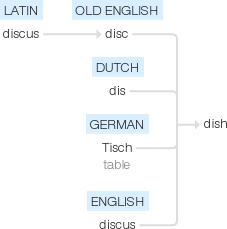Dish
Old English disc ‘plate, bowl’ (related to Dutch dis, German Tisch ‘table’), based on Latin discus (see discus).
wiktionary
From Middle English dissh, disch, from Old English disċ(“plate; bowl; dish”), from Proto-West Germanic *disk(“table; dish”), from Latin discus. Doublet of dais, desk, disc, discus, disk, and diskos.
etymonline
dish (n.)
Old English disc "plate, bowl, platter," from Latin discus "dish, platter, quoit," in Medieval Latin "a table, dais, desk, pulpit," from Greek diskos "disk, platter" (see disk (n.)).
A common West Germanic borrowing; Old High German took the word as tisc "plate," but German Tisch now means "table," in common with some other later Romanic forms of Latin discus (such as Italian desco, French dais); compare desk (n.), dais.
Meaning "particular variety of food served in a dish" is first recorded mid-15c. Meaning "what one likes, what is suited to one's taste" is by 1918; that of "attractive woman" is 1920s. Meaning "concave reflector or antenna" attested from 1948.
Originally applied to very shallow or flat vessels, as plates and platters, the term now usually includes any large open vessel, more or less deep, and with or without a cover, used to contain food or table-drink such as tea, coffee, or chocolate. The use of the term to include drinking-vessels, as bowls and cups, is less common, and seems to be obsolescent, except as such vessels are included in the collective plural dishes. [Century Dictionary, 1897]
dish (v.)
"to serve food in a dish or dishes," late 14c., from dish (n.). German tischen is "serve the table" and Swedish diska is "to wash dishes."
The modern slang meaning "to disparage, denigrate" is attested by 1940s; probably from the same figurative notion in dish it out "administer punishment" (1934). But dished meant "wasted, spent" in early 15c., presumably "used up as if made a meal of," and the same image was reborn centuries later in slang dish "frustrate, ruin, cheat" (1798), used by Byron, Scott, etc. Related: Dished; dishing.
